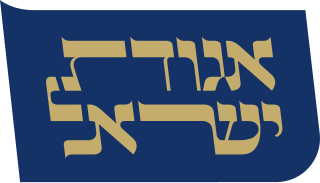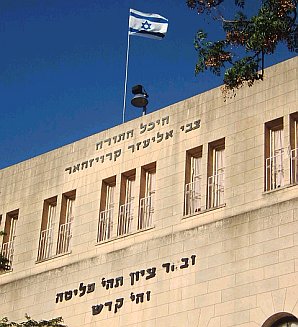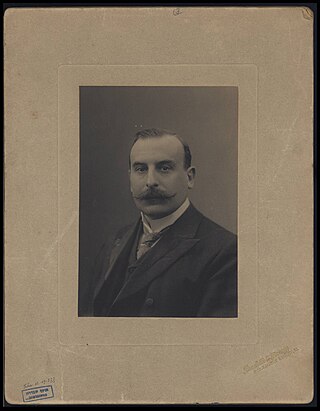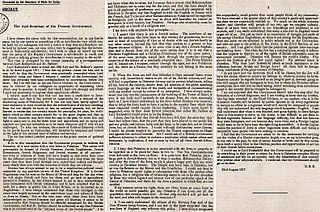Related Research Articles

The Balfour Declaration was a public statement issued by the British Government in 1917 during the First World War announcing its support for the establishment of a "national home for the Jewish people" in Palestine, then an Ottoman region with a small minority Jewish population. The declaration was contained in a letter dated 2 November 1917 from the United Kingdom's Foreign Secretary Arthur Balfour to Lord Rothschild, a leader of the British Jewish community, for transmission to the Zionist Federation of Great Britain and Ireland. The text of the declaration was published in the press on 9 November 1917.

Zionism is a nationalist movement that emerged in Europe in the 19th century to enable the establishment of a homeland for the Jewish people in Palestine, a region roughly corresponding to the Land of Israel in Jewish tradition. Following the establishment of the modern state of Israel, Zionism became an ideology that supports the development and protection of the State of Israel as a Jewish state.

Neturei Karta is a fringe religious group of Haredi Jews that was founded in Jerusalem in 1938 after splitting off from Agudat Yisrael. It is an active opponent of Zionism and advocates a "peaceful dismantling" of the State of Israel under the belief that the Jewish people are strictly forbidden from re-establishing sovereignty in the Land of Israel until the arrival of the Messiah. To this end, the group's members believe that the existence of a Jewish state is a rebellion against God as it did not occur with divine intervention through the Messiah.
Jewish fundamentalism refers to fundamentalism in the context of Judaism. The term fundamentalism was originally used in reference to Christian fundamentalism, a Protestant movement which emphasizes a belief in biblical literalism. Today, it is commonly used in reference to movements that oppose modernist, liberal, and ecumenical tendencies within societies as well as modernist, liberal and ecumenical tendencies within specific religions and it is often coupled with extremist ideologies and/or political movements. The use of this definition is important in a Jewish context because the two movements which are most commonly associated with Jewish fundamentalism, Religious Zionism and Haredi Judaism, stray far from biblical literalism due to the importance of the Oral Law within Judaism. In fact, Karaism, the Jewish movement which is well-known due to its emphasis on biblical literalism, is rarely considered fundamentalist.
Jewish religious movements, sometimes called "denominations", include diverse groups within Judaism which have developed among Jews from ancient times. Today in the west, the most prominent divisions are between traditionalist Orthodox movements and modernist movements such as Reform Judaism originating in late 18th century Europe, Conservative originating in 19th century Europe, and other smaller ones, including the Reconstructionst and Renewal movements which emerged later in the 20th century in the United States.

Religious Zionism is an ideology that views Zionism as a fundamental component of Orthodox Judaism. Its adherents are also referred to as Dati Leumi, and in Israel, they are most commonly known by the plural form of the first part of that term: Datiim. The community is sometimes called 'Knitted kippah', the typical head covering worn by male adherents to Religious Zionism.

The Soloveitchik dynasty of rabbinic scholars and their students originated the Brisker method of Talmudic study, which is embraced by their followers in the Brisk yeshivas. It is so called because of the Soloveitchiks' origin in the town of Brisk, or Brest-Litovsk, located in what is now Belarus. Many of the first Soloveitchik rabbis were the official rabbis of Brisk, and each in turn was known as "the Brisker Rov". Today, Brisk refers to several yeshivas in Israel and the United States founded by members of the Soloveitchik family, including: ‘Brisk Proper’(Now run by R’ Abraham Yehousua Soloveitchik),R’ Dovid’s, Tomo(Toras Moshe), and others.

Agudat Yisrael is a Haredi Jewish political party in Israel. It began as a political party representing Haredi Jews in Poland, originating in the Agudath Israel movement in Upper Silesia. It later became the party of many Haredim in Israel. It was the umbrella party for many, though not all, Haredi Jews in Israel until the 1980s, as it had been during the British Mandate of Palestine.

Jacob Israël de Haan was a Dutch Jewish literary writer, lawyer and journalist who immigrated to Palestine in 1919. There he became more religiously committed and served as the political spokesman of the Haredim in Jerusalem. He was assassinated in 1924 by the Zionist paramilitary organization Haganah for his anti-Zionist political activities.

From the founding of political Zionism in the 1890s, Haredi Jewish leaders voiced objections to its secular orientation, and before the establishment of the State of Israel, the vast majority of Haredi Jews were opposed to Zionism, like early Reform Judaism, but with distinct reasoning. This was chiefly due to the concern that secular nationalism would redefine the Jewish nation from a religious community based in their alliance to God for whom adherence to religious laws were "the essence of the nation's task, purpose, and right to exists," to an ethnic group like any other as well as the view that it was forbidden for the Jews to re-constitute Jewish rule in the Land of Israel before the arrival of the Messiah. Those rabbis who did support Jewish resettlement in Palestine in the late 19th century had no intention to conquer Palestine and declare its independence from the rule of the Ottoman Turks, and some preferred that only observant Jews be allowed to settle there.
Hashkafa is the Hebrew term for worldview and guiding philosophy, used almost exclusively within Orthodox Judaism. A hashkafa is a perspective that Orthodox Jews adopt that defines many aspects of their lives. Hashkafa thus plays a crucial role in how these interact with the world around them, and influences individual beliefs about secularity, gender roles, and modernity. In that it guides many practical decisions—where to send children to school, what synagogue to attend, and what community to live in—hashkafa works in conjunction with halakha or Jewish law.
As an organized nationalist movement, Zionism is generally considered to have been founded by Theodor Herzl in 1897. However, the history of Zionism began earlier and is intertwined with Jewish history and Judaism. The organizations of Hovevei Zion, held as the forerunners of modern Zionist ideals, were responsible for the creation of 20 Jewish towns in Palestine between 1870 and 1897.

L. J. Greenberg, born Leopold Jacob Greenberg (1861–1931), was a British journalist. He had become an energetic propagandist of the new Zionism in England by the Third Zionist Congress in 1899, at which he and Jacob de Haas were elected as members of the ZO's Propaganda Committee. His frequent dialectical debates were conducted as editor of The Jewish Chronicle, the leading paper in Britain for the Jewish community. Greenberg called for decency and humanity towards World Jewry.

Anti-Zionism is opposition to Zionism. Although anti-Zionism is a heterogeneous phenomenon, all its proponents agree that the creation of the modern State of Israel, and the movement to create a sovereign Jewish state in the region of Palestine—a region partly coinciding with the biblical Land of Israel—was flawed or unjust in some way.
The American Council for Judaism (ACJ) is an organization of American Jews committed to the proposition that Jews are not a national but a religious group, adhering to the original stated principles of Reform Judaism, as articulated in the 1885 Pittsburgh Platform. In particular, it is notable for its historical opposition to Zionism. Although it has since moderated its stance on the issue, it still advocates that American Jews distance themselves from Israel politically, and does not view Israel as a universal Jewish homeland. The ACJ has also championed women's rights, including the right for women to serve as rabbis, and has supported Reform Jewish congregations and contributed to the publication of new editions of prayer books for religious services predominately in the English language for Jews in English-speaking countries.
Ihud was a small binationalist Zionist political party founded by Judah Leon Magnes, Martin Buber, Ernst Simon and Henrietta Szold, former supporters of Brit Shalom, in 1942 as a binational response to the Biltmore Conference, which made the establishment of a Jewish Commonwealth in Palestine the policy of the Zionist movement. Other prominent members were David Werner Senator, Moshe Smilansky, agronomist Haim Margaliot-Kalvarisky (1868–1947), and Judge Joseph Moshe Valero.
Religious relations in Israel are relations between Haredim, non-Haredi Orthodox, Karaite, Ethiopian, Reform, Conservative, and secular Jews, as well as relations between different religions represented in Israel. The religious status quo, agreed to by David Ben-Gurion with the Orthodox parties at the time of Israel's declaration of independence in 1948, is an agreement on the role that Judaism would play in Israel's government and the judicial system. Tensions exist between religious and secular groups in Israel.
This timeline of anti-Zionism chronicles the history of anti-Zionism, including events in the history of anti-Zionist thought.
Post-Zionism is the opinion of some Israelis, diaspora Jews and others, particularly in academia, that Zionism fulfilled its ideological mission with the formation of the modern State of Israel in 1948, and that Zionist ideology should therefore be considered at an end. The Jewish right also use the term to refer to the Israeli Left in light of the Oslo Accords of 1993 and 1995. Some critics associate post-Zionism with anti-Zionism; proponents strenuously deny this association.
Zionist antisemitism or antisemitic Zionism refers to a phenomenon in which antisemites express support for Zionism and the State of Israel. In some cases, this support may be promoted for explicitly antisemitic reasons. Historically, this type of antisemitism has been most notable among Christian Zionists, who may perpetrate religious antisemitism while being outspoken in their support for Jewish sovereignty in Israel due to their interpretation of Christian eschatology. Similarly, people who identify with the political far-right, particularly in Europe and the United States, may support the Zionist movement because they seek to expel Jews from their country and see Zionism as the least complicated method of achieving this goal and satisfying their racial antisemitism.
References
- ↑ "FAQ on the Anti-Zionism is Antisemitism Divide". The Times of Israel . 7 February 2022.
The defining feature of non-Zionism is the lack of actively working to aid or harm the Jewish state.
- ↑ Egal Feldman, Catholics and Jews in Twentieth-Century America, University of Illinois Press, 2001, p.40.
- ↑ Yoram Dinstein, Anti-Semitism, Anti-Zionism and the United Nations in Israel's Yearbook of Human Rights, Faculty of Law, Tel-Aviv University, vol.17, Martinus Nijhoff Publishers, 1987, p.16.
- ↑ Frosh, Anthony (August 30, 2009). "Non-Zionism: an Under-Recognised Non-Position". Galus Australis. Archived from the original on 8 October 2011. Retrieved 22 April 2020.